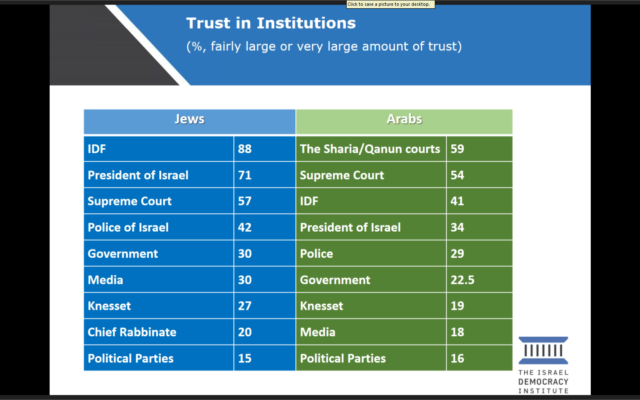Israelis Like Life, not Government
Arabs, who make up about 16 percent of Israel’s adult population, have less trust in Israeli institutions.
Israelis generally lack trust in the institutions of their democracy but believe that Israel is a good place to live, according to the 2017 Israeli Democracy Index, released in mid-December by the Israel Democracy Institute.
Among the Jewish respondents, only 42 percent expressed trust in the police, 30 percent in the government and the media, 27 percent in the Knesset, 20 percent in the Chief Rabbinate, and 15 percent in Israel’s political parties.
The Israel Defense Forces (88 percent), President Reuven Rivlin (71 percent) and Supreme Court (57 percent) are the only Israeli institutions that have the trust of most Israeli Jews, and most of the court’s support comes from Jews who are secular or occupy the political center or left, said Tamar Hermann, the academic director of the IDI’s Guttmann Center for Public Opinion and Policy Research, who briefed members of the American Jewish Press Association on the index Dec. 11.
Not surprisingly, Arabs, who make up about 16 percent of Israel’s adult population, had less trust in Israeli institutions: 59 percent for the Islamic courts, 54 percent for the Supreme Court, 41 percent for the IDF, 34 percent for the president, 29 percent for the police, 22.5 percent for the government, 19 percent for the Knesset, 18 percent for the media and 16 percent for the political parties.
Hermann said it was disappointing that Rivlin lost trust among Israeli Arabs because he also had declining trust numbers among Jews based on the perception that he was too pro-Arab.
Still, both Jews and Arabs think that Israel is a good place to live: 86 percent of Jews and 73 percent of Arabs strongly or somewhat agreed with that sentiment in the survey.
“With all the complaints that Israelis are complaining about, they think that life here is good,” Hermann said. She said family ties are an important factor: People are confident that they won’t be neglected if times are tough, even though they don’t expect any help from the government.
Sixty-three percent of Jewish respondents and 76 percent of Arabs said politicians are disconnected from the public’s real problems, but Hermann said those numbers are similar to the findings in most democratic countries.
Even though a democratic system offers protections for minorities, only 44 percent of Arab respondents disagreed with the statement that “a democratic system of government is not appropriate for Israel,” compared with 81 percent of Jews. Hermann said that is a consistent finding that reflects democracy’s shallow roots in the Middle East.
The index is based on an extensive public opinion survey in May of a representative adult sample of 864 Jews and 160 Arabs. Jews were interviewed in Hebrew, Arabs in Arabic. Based on the lack of critical events in the six months between the survey and the index’s release, and based on the IDI’s monthly surveys, Hermann said, the IDI is confident that the results remain valid.




comments